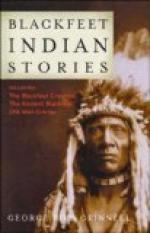“Look at my leg,” said Mika’pi; “swollen and sore. See my wounded arm; I can hardly hold the bow. Far away is the home of my people, and my strength is gone. Surely here I must die, for I cannot walk, and I have no food.”
“Take courage, my brother,” said the bear. “Keep up a strong heart, for I will help you, and you shall have life.”
When he had said this he lifted Mika’pi in his arms and took him to a place where there was thick mud, and there he took great handfuls of the mud and plastered it on the wounds, and while he was putting on the mud he sang a medicine song. Then he carried Mika’pi to a place where there were many service berries, and he broke off great branches of the fruit and gave them to him, saying, “Eat; my brother, eat.” He kept breaking off branches full of large, ripe berries until Mika’pi was full and could eat no more.
Then said the bear, “Now lie down on my back and hold tight by my hair and we will go on”; and when Mika’pi had got on his back and was ready the bear started. All through the night he travelled on without stopping, and when morning came they rested for a time and ate more berries, and again the bear put mud upon the man’s wounds. In this way they travelled on, until, on the fourth day, they had come close to the lodges of the Piegans and the people saw them coming, and wondered.
“Get off now, my brother, get off,” said the bear. “There is the camp of your people. I shall leave you”; and at once he turned and went off up the mountain.
All the people came out to meet Mika’pi, and they carried him to his father’s lodge. He untied the scalps from his belt and gave them to the poor widows, saying, “These are the scalps of your enemies; I wipe away your tears.” Then every one rejoiced. All Mika’pi’s women relations went through the camp, shouting out his name and singing songs about him, and all prepared to dance the dance of triumph and rejoicing.
First came the widows. They carried the scalps tied on poles, and their faces were painted black. Then came the medicine men, with their medicine pipes unwrapped, and then the bands of the All Friends dressed in their war costumes; then came the old men; and, last of all, the women and children. They went all through the village, stopping here and there to dance, and Mika’pi sat outside the lodge and saw all the people dance by him. He forgot his pain and was happy, and although he could not dance, he sung with them.
Soon they made the medicine lodge, and first of all the warriors, Mika’pi was chosen to cut the rawhide to bind the poles, and as he cut the strips he related the coups he had counted. He told of the enemies he had killed, and all the people shouted his name and the drummers struck the drum. The father of those two sisters gave them to him. He was glad to have such a son-in-law.
Long lived Mika’pi. Of all the great chiefs who have lived and died he was the greatest. He did many other great things. It must be true, as the old men have said, that he was helped by the ghosts, for no one can do such things without help from those fearful and terrible persons.




